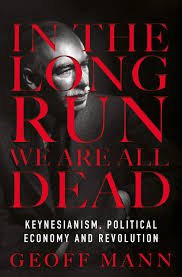Adam Tooze at the LRB:
 ‘If we don’t do this, we may not have an economy on Monday,’ the chairman of the US Federal Reserve, Ben Bernanke, said on 18 September 2008 when he demanded action from Congress to assist the banking system. Ten years later we do still have an economy. But it is worth asking whether the panic back then foreclosed other ways forward. In that terrible autumn a decade ago, the first priority was survival. To sit back and let nature take its course was to court disaster, as the collapse of Lehman Brothers proved. The bailouts were ugly, but it would have required a particular kind of fanaticism to dissociate oneself from the rescue effort and accept the risk of catastrophe. Yet in Trump, Brexit and the rise of nationalism across much of Western Europe, are we not seeing the political consequences? Was the crisis an opportunity missed? If there was a single figure whose ideas seemed pertinent in that deeply ambiguous moment, it was John Maynard Keynes. The implosion of the financial system vindicated him against his critics, who had declared markets self-stabilising and government intervention counterproductive. With trade, investment and consumption collapsing and millions cast into unemployment, the world was desperate for fiscal stimulus, and there were calls on all sides for greater controls on banking and financial markets. Keynes is the godfather of policy activism, but, as Geoff Mann argues in his brilliant book In the Long Run We Are All Dead, he is also the best hope of those who want to keep the show on the road by whatever means necessary. He promised both the avoidance of disaster and the preservation of the status quo.
‘If we don’t do this, we may not have an economy on Monday,’ the chairman of the US Federal Reserve, Ben Bernanke, said on 18 September 2008 when he demanded action from Congress to assist the banking system. Ten years later we do still have an economy. But it is worth asking whether the panic back then foreclosed other ways forward. In that terrible autumn a decade ago, the first priority was survival. To sit back and let nature take its course was to court disaster, as the collapse of Lehman Brothers proved. The bailouts were ugly, but it would have required a particular kind of fanaticism to dissociate oneself from the rescue effort and accept the risk of catastrophe. Yet in Trump, Brexit and the rise of nationalism across much of Western Europe, are we not seeing the political consequences? Was the crisis an opportunity missed? If there was a single figure whose ideas seemed pertinent in that deeply ambiguous moment, it was John Maynard Keynes. The implosion of the financial system vindicated him against his critics, who had declared markets self-stabilising and government intervention counterproductive. With trade, investment and consumption collapsing and millions cast into unemployment, the world was desperate for fiscal stimulus, and there were calls on all sides for greater controls on banking and financial markets. Keynes is the godfather of policy activism, but, as Geoff Mann argues in his brilliant book In the Long Run We Are All Dead, he is also the best hope of those who want to keep the show on the road by whatever means necessary. He promised both the avoidance of disaster and the preservation of the status quo.
more here.
